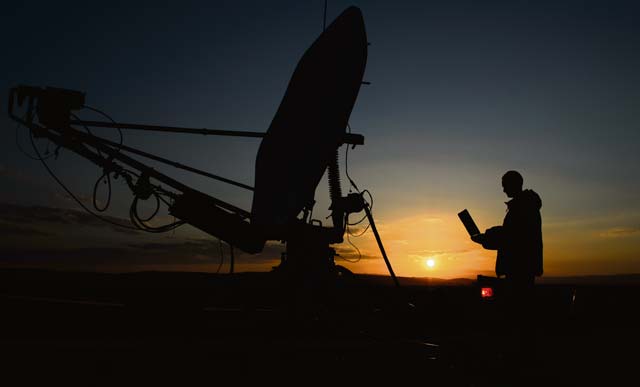
Senior Airman David Vogt, 1st Combat Communications Squadron radio frequency transmission technician, ensures proper connection for the 435th Air Ground Operations Wing March 16 at Campia Turzii, Romania. The 435th AGOW participated in Dacian Warhawk, which featured U.S. and Romanian airmen working side-by-side to establish a base and conduct ground and air operations with NATO partners.
CAMPIA TURZII, Romania — Airmen from the 435th Air Ground Operations Wing departed March 10 from Ramstein for what seemed like any other training mission; however, this mission, known as Dacian Warhawk, is unlike any other in which they have participated.
During the bilateral mission at Campia Turzii, Romania, the 435th AGOW was afforded the opportunity to execute four of their distinct mission sets, which makes the wing unlike any other. These mission sets include expeditionary airfields on demand, multi-theater sustainment and support, joint airpower integration and building partnership capacity.
Prior to Dacian Warhawk, these capabilities were executed individually as the wing’s groups performed their core missions. Dacian Warhawk became a way for the AGOW units to come together and begin forming a plan to streamline these capabilities efficiently.
Beyond incorporating the majority of the AGOW mission sets, Dacian Warhawk also tested one of the wing’s expeditionary capabilities in a new way.
When providing expeditionary support, the 435th AGOW travels to austere locations to establish an air base, or airfield, so aircraft can safely land and deliver follow-on capabilities. The mission is usually short-term and the wing hands over control to the operational forces on arrival. However, due to the nature of Dacian Warhawk, the support mission continued throughout the nearly three-weeklong event. Their goal is to be able to perform these mission sets as turn-key operations to provide the best possible operational support to fighter units.
“We have a tremendous amount of capabilities within the 435th AGOW, within the 435th Air and Space Communications Group, 4th Air Support Operations Group and the 435th Contingency Response Group, but we’ve never operated like this before,” said Col. Steven Edwards, 435th Contingency Response Group commander. “The Dacian Warhawk mission is providing us an opportunity to expand the capabilities of the 435th AGOW and work through our current procedures and establish new procedures to be able to support this type of mission in the future.”
Expanding the capabilities of the wing requires some units to operate in ways they never have, such as security forces personnel providing continuous defense of the base and assets, but the AGOW was prepared. Though the 435th AGOW Airmen have never operated in this manner, they have been preparing for this type of mission for quite some time. According to Capt. Craig Towlson, 435th AGOW chief of wing plans and programs, Dacian Warhawk is the culmination of approximately one year of brainstorming and six months of planning.
“Through internal planning and guidance from the wing commander, we developed a concept to first bring the wing together, which started as a table-top exercise in October 2013,” Towlson said. “With the three groups being operationally successful on their own, we wanted to achieve success as one organization in order to provide our combatant commander an option no other wing can provide. Built around Dacian Warhawk 2015, the 52nd Fighter Wing’s flying training deployment, we planned a proof-of-concept training mission to capture the AGOW’s capabilities in support of fighter operations.”
Because 435th AGOW leaders saw the need to actively exercise the wing’s full capabilities to set up and maintain airfield and communications operations for short-term missions, they also needed a way to plan and evaluate their efforts.
“The wing plans and programs office was set up to track and plan current and future operations like Dacian Warhawk,” Towlson said. “We leverage the expertise within each group and squadron to bring the wing together, eliminating redundancies of our capabilities across the wing. Being on the ground here in Romania will help us refine our proof-of-concept and allow us to provide direct support to fighter squadrons in the future.”
The plans and programs office is continuing to gather lessons learned and refine 435th AGOW procedures to better suit the mission’s needs, but according to Towlson, so far this mission is a success.
“It’s an outstanding feeling watching these aircraft launch and realize that we had a part in making it happen,” Edwards said. “Whether it was our aerial porters downloading vehicles and supplies, our medical personnel supporting Airmen, our mobile aircraft arresting system personnel protecting the jets, our joint terminal attack controllers on the range, or our communication specialists establishing connectivity, we all had a part supporting the flying mission.”
Edwards added that without the help of the other Dacian Warhawk participants, the 480th Fighter Squadron and Romanian airmen at Campia Turzii, the mission would not have gone as well.
As Dacian Warhawk continues, Airmen of the 435th AGOW will continue to provide mission support to the 480th FS while working closely with the Romanian airmen to increase interoperability between both nations.







